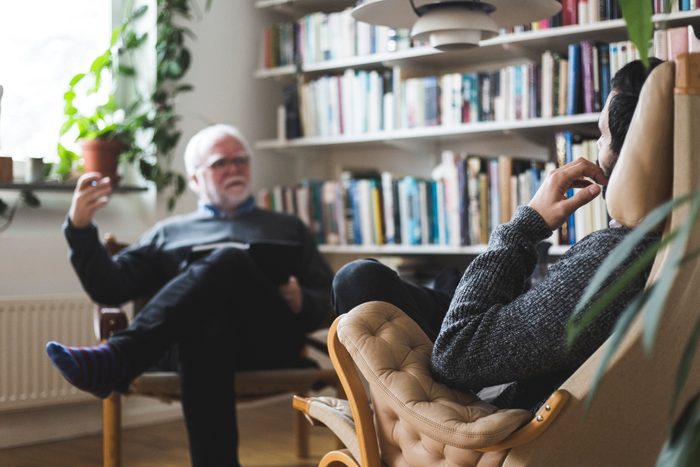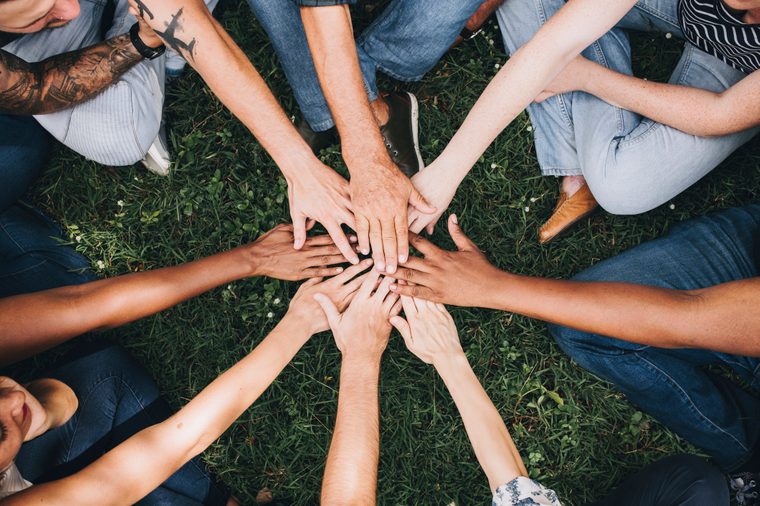
Signs therapy is working
It might take some trial and error to find the best therapist for you. Once you do find the right match and attend sessions, at some point, you might ask yourself if it’s helping or “working.” It can be challenging to measure success in therapy because there are so many nuances. For example, your goals and reasons for seeking treatment may change over time. So it may not always be extremely clear when therapy “works” or doesn’t work. That said, here are some signs of improvement and ways to measure your progress, according to therapists.

1. Your relationships with others start to improve
When your relationships with others start to become stronger or you start to form new relationships more easily, it’s a sign that your therapy is working. “People start to respond to the improvements that they see in their friends and family members, so they are more likely to include that person, and be more open,” says Michael J. Salas, licensed professional counselor at Vantage Point Counseling. This can be a result of you putting more effort into your current relationships, or working to step out of your comfort zone to build new ones. (Did you know the secret to happiness is concentrating on your relationships?)
2. You hear your therapist’s voice in your head
When we are alone with our thoughts it can be very easy to think negatively. “All that second-guessing and criticism leads to anxiety and depression,” Caroline Madden, author, and licensed marriage and family therapist says. “Hopefully, you have heard your therapist gently counter those thoughts enough that you start believing her and integrating them…and thereby believing in yourself.”

3. Your relationship with your therapist is stronger
In order for your therapy to be successful, it’s important that you have a strong relationship with your therapist. If you feel very open around them and more comfortable than you did in the beginning, it shows that you are willing to share more and work together to solve your conflicts. (Learn how a therapist does her job in quarantine.)
4. Your self-esteem improves
Salas sees this as the most important sign that your therapy is working. A sign that you are getting better is that you start to see what is important to you and makes your self-esteem improve. “They start to put things in place that help them to feel better about themselves, with less shame about doing so,” Salas said. “Rather than looking to fill their esteem tank up from only outside sources, they start to do it from within.” (Do you still feel your self-esteem could use improvement? Here’s how to get rid of that negative energy.)

5. You have a higher emotional tolerance
Therapy helps you to understand your emotions and why you experience them and how to control them. “They [the clients] start to learn that these emotions can be tolerated. This helps them better understand negative emotions, while also appreciating more positive emotions,” Salas said.
6. You’re able to reflect on what brought you into counselling
Think back to what made you seek out counselling in the first place. Does that event or experience still bring up the same feelings as it did before? Ask you family or close friends if they think you’ve improved since you started therapy.

7. Your overall health improves
A sign that your therapy is working is if your overall health improves, not just your emotional health but also your physical health. Common improvements are that you sleep better, you feel less sluggish, and any stomach issues you had are resolved.
8. You learn to take responsibility for your actions
It’s important to understand when you overreact to a situation. If you notice that you handle situations that normally would have made you upset differently then your therapy is working. Once you accept that sometimes you’re the one getting in your way, you will be able to grow a lot.
9. Your therapist says that you have improved
This seems like a very obvious way to answer the question of whether your therapy is working or not, but it’s important to set goals with your therapist and have a mutual understanding that you are looking to make significant progress through this process. “They should have a treatment plan and be able to give you feedback on where you started and where you are now,” Madden said. “They should also be able to tell you how they see you progressing from here.”
Next, check out these therapist tips for finding hope in dark times.
